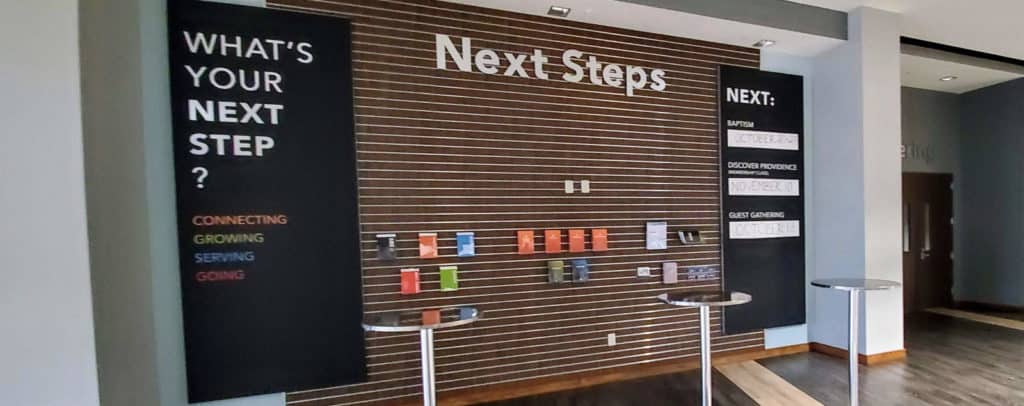“If life were predictable it would cease to be life, and be without flavor.”
–Eleanor Roosevelt
The challenge with eliminating predictability is that it’s impossible to prescribe a predictable system to eliminate it. That said, I’ve had the opportunity to work with some very creative teams that have successfully moved beyond the routine to bring life and flavor to weekend services. As I look back on the effectiveness of those teams, these are four common biases that they all shared.
#1 – They had a bias for planning ahead.
You’d think planning would be the antithesis of creativity, but the reality is that unpredictability doesn’t naturally occur. Rather creativity is a discipline that is developed over time. With that, eliminating predictability requires planning ahead and planning with a team.
For churches, I’m a big proponent of developing a creative process to drive series, services and message content. That includes:
- Starting with a teaching calendar 6 to 12 months out.
- Planning for each teaching series 3 months before the series starts.
- Designing each service 6 to 8 weeks out.
- Preparing the message 3 weeks ahead of its delivery.
- Evaluating the service every week.
I’ve written about this creative process in the past, so I won’t bore you with the details here. Needless to say, when you create space in the planning process, it allows more people more time to contribute their gifts and unique personalities to improve the quality of the teaching and all the other service elements that support it.
Speaking of people, one of the keys to eliminating predictability is inviting different people into the process. The same people will generally deliver the same experience. There’s no commandment in the Bible that says the same people need to plan every service. Yes, there will likely be several leaders who are involved in planning every series and every service, but look for opportunities to engage different voices in the planning process. Those fresh voices will bring fresh perspectives.
One key sidenote here, make sure you keep the “doers” away from the initial steps in the creative process. Design the experience and then bring the doers into the process to help execute the elements. If you include your doers early in the process, they’ll kill just about every new idea you generate. Doers don’t like change. They’ll fight for doing things the way you’ve always done them because that’s where they have confidence they can deliver.
#2 – They had a bias for intentional creativity.
I’d encourage you to begin by identifying the key thought and the next step you want people to take in each service. Having that boundary or constraint will help to fuel creativity. The team can begin by designing one unique element that supports that key thought or next step. This framework will challenge the team to be creative for a purpose rather than being creative for creativity’s sake.
Start by dedicating five minutes of each service to include this unique creative element. In addition to the message and the worship set, what’s the one unique element that will support the key thought or next step? Once you’ve identified the element, decide where it best fits in the service. Does it belong at the very beginning to set the mood? Does it belong before the message to set up the conflict that the message will resolve? Does it belong at the end of the message to provide a moment for reflection?
In other words, I’m challenging to you design the entire service to tell one story instead of a collection of distinctive standalone elements.
#3 – They had a bias toward test-driving something new.
New ideas don’t typically show up spontaneously. Most churches test-drive something creative and then get stuck. If it doesn’t work, they don’t try again. If it does work, they never stop doing it. The worst thing you could do when trying to build a culture of creativity is to find a creative idea that works and use it over and over and over again. Thus, the current predictability problem. Tomorrow, I’ll share nine creative challenges to help you discover something new with your team.
#4 – They had a bias for celebrating the unpredictable.
Creativity needs to become a value that is lived, fueled, modeled and celebrated. I once heard a leader I respect suggest that your culture will reflect the leadership of the top five people in your organization. The longer I study healthy organizations, the more I know that is true. So take a look around? Do the people around you live predictable lives? Then you will probably have predictable services on Sunday morning. If you want to change your culture, it needs to begin with the top leaders on your team.
Encourage calculated risks. Allow for failure. Reward the people who are willing to take a chance on something new.
By the way, this is where establishing a framework of clear mission, vision and values is so critical. You can’t just let people have free reign to take risks if you don’t first establish the boundaries. Everyone needs to know why you exist as an organization. Everyone must have clarity around where you are heading in the future. Everyone should be well aware of the core values that drive decision-making and action. If that framework is clear, then there’s a lot of freedom within the margins to take risks and try new things.
Over time, hopefully you will have the opportunity to celebrate more wins than failures, but you have to begin celebrating those calculated risks, regardless of outcome, if you want to move beyond the predictable.
Do your weekend services need a burst of “flavor” because they’ve become too predictable? If so, your team can begin by embracing these four biases to promote creativity and make your services more engaging.








Leave a Reply